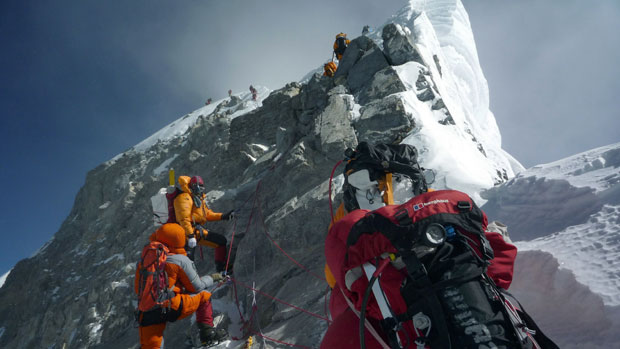Why are so many people dying on Mount Everest?
Overcrowding and inexperience are blamed as season's death toll reaches 10

A free daily email with the biggest news stories of the day – and the best features from TheWeek.com
You are now subscribed
Your newsletter sign-up was successful
An American climber died on the descent from the summit of Mount Everest yesterday, the latest in a string of deaths on the world’s highest mountain.
The death of American attorney Christopher John Kulish, 62, brings the toll for the 2019 climbing season to 10 people. According to reports, Kulish reached the 29,035ft peak in the morning but died suddenly while descending.
For the past 20 years, the average annual death rate of climbers on Mount Everest has been around six, but this year at least 10 people have already been reported dead or missing on the world's highest peak.
The Week
Escape your echo chamber. Get the facts behind the news, plus analysis from multiple perspectives.

Sign up for The Week's Free Newsletters
From our morning news briefing to a weekly Good News Newsletter, get the best of The Week delivered directly to your inbox.
From our morning news briefing to a weekly Good News Newsletter, get the best of The Week delivered directly to your inbox.
Overcrowding has been widely blamed for the rising death rate. This season, a record 381 climbing permits were issued by the Nepalese government, which means around 600 people will embark on the climb.
The area where mountaineers have been delayed in a queue for the summit is widely known as the “death zone,” because of the lack of oxygen. Eerily, the British climber Robin Haynes Fisher, who died on Mount Everest on Saturday, had earlier written on Instagram that “with a single route to the summit, delays caused by overcrowding could prove fatal.”
A dramatic photograph published by CNN shows a “deadly traffic jam” at the top of Everest, bringing home the dangerous build-up of climbers.
New tour operators have also been blamed. With new agencies offering cheaper prices, they are “hiring inexperienced people as guides who cannot offer the right guidance to their clients,” Tshering Pande Bhote, vice president of Nepal National Mountain Guides Association, told the BBC.
A free daily email with the biggest news stories of the day – and the best features from TheWeek.com
Inexperienced climbers could also be a factor. Many groups set off with just one Sherpa guide with their team, but experts say this is insufficient, because in any perilous moment, the Sherpa will have to take care of themself.
Mountain guide Adrian Ballinger told CNN
he has noticed a “lower level of experience of the climbers trying to come here and also of the companies that are trying to offer services on the mountain”.
Bad weather has been another factor, with Cyclone Fani leading many climbers to delay their climb, which only added to the crowds. On 23 May, there was the maximum number of climbers for one day - more than 250.